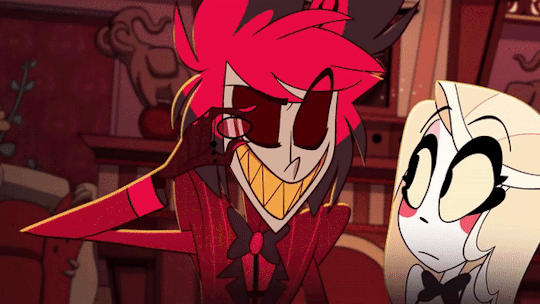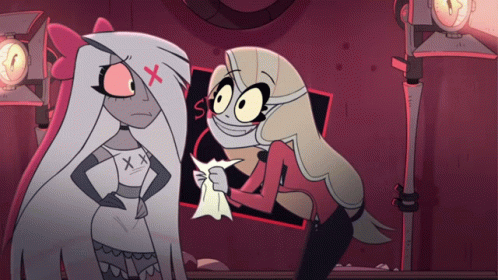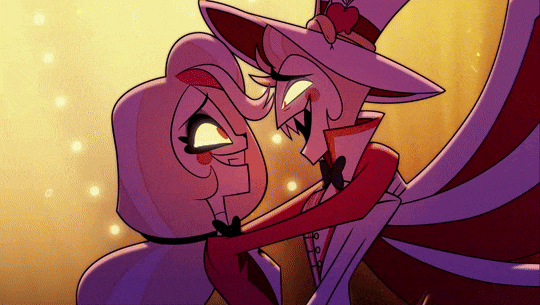#SHOVES THIS POST IN THE FACE OF THIS ENTIRE CHRISTO-FASCIST SOCIETY
Explore tagged Tumblr posts
Text
I cannot stress this post enough.
Hazbin Hotel Has Better Theology Than Most Modern "Christian" Stories
As a Christian who was raised in a fundie cult and escaped to now have a far healthier and vital faith, I genuinely really like this show. The songs are bops. The characters are well crafted and interesting, and likable too. The art design is bizarre but appealing.
And, as a theology nerd who studied theology as part leaving said cult and also has since gotten papers published in theology, I'm actually fairly impressed by the show's handling of theology.

No, I'm not expecting the story to preach or even like, be explicitly Christian in a lot of ways. But it's taking a lot of the really beautiful aspects of Christian theology and re-contextualizing them in a way designed to provoke thought: by juxtaposing them with the antithesis of what you would think, by making demons heroes. In my opinion, this makes the beauty shine brighter.
Yeah, yeah, it's designed to be offensive and obscene in a lot of ways. Yet, it's never (thus far) mean-spirited. On the contrary, it seems to have a big, beating heart at its core that is perhaps best embodied by Charlie Morningstar, its protagonist and the daughter of Lucifer and Lilith.
Critique of the Church, with Caveats

The story works best with an interpretation that heaven isn't actually heaven or God (who has been conspicuously absent), but instead as a critique of the church. Specifically, the evangelical American church, and specifically, white evangelicals. (Same as She-Ra's premise, actually).
God's absence therefore makes sense, because while Christians do believe God is present as a living reality among us, we also can't like, see him physically now. So, God being not even mentioned in HH makes it seem more like a mortal reality rather than an immortal one. Honestly I kinda hope God doesn't appear in the story, not only because I think it could cross some lines (which is admittedly personal), but also because I don't see that the story really needs it.
Adam in particular reminds me of every "theobro" on Twitter (I'm not calling it what you want me to, El*n). Basically a dudebro coopting his supposed salvation to flex in an often misogynistic way, who doesn't realize that he has absolutely no love in him and therefore is actually a worse human being than everyone he condemns on the regular.
(Which is kind of why I'm expecting Adam to wake up in hell next season...)
Think red hats. And Mark Driscoll. And, I have a list of pastors. Sigh. They advocate for how "simple" Christianity is, except they themselves make it ridiculously complicated and don't even examine what they suppose is "simple" if it requires them to take the planks out of their own eyes. "Shallow" is a better description of what they actually preach.
But what sends people to hell or heaven anyways?
Eschatology and Atonement Theory

Hazbin Hotel combines a lot of theories, throwing not only the idea of a physical hell (albeit mixed with Dante's idea of what hell is the Inferno, but to be fair a lot of the church has adopted that idea too) but the idea of annihilation, which HH calls "extermination."
See, in Christianity, there's a lot of debate about hell. Like, since 2000 years ago. The reason is because a lot of Bible verses seem to indicate hell, but others indicate the eventual redemption and salvation of absolutely everything in the universe, so you have Christian universalism tracing itself back just as long. But, setting aside universalism, people who do believe in hell tend to fall into one of two camps:
Physical hell, aka suffering for eternity, or annihilation: the idea that souls that aren't saved end up annihilated, or snuffed from existence. HH combines both of them, wherein everyone lives in hell but then every so often heaven "exterminates" a certain number of sinners.
And then you also have Catholic purgatory, which is also adapted in HH in that... for most Christians, physical hell doesn't offer the ability to redeem yourself. Chance over, you're dead. But, Catholic Christianity, which draws on ideas of praying for the dead, has the idea that people can improve themselves or be prayed out of it and into heaven. This seems to be somewhat similar to the idea of Charlie's hotel, in that sinners can improve, redeem themselves, and rise to heaven.
And, I mean, it's already kinda worked. Sir Pentious acted out Jesus' words: Greater love has no man than this, that he lay down his life for his friends (John 15:13).

But anyways, the branch of theology that deals with the afterlife is eschatology. And Hazbin Hotel takes on a related form of theology as well, a type of theology I've only seen covered in stories once before (The House in Fata Morgana): atonement theory.
Atonement theory is something I remember well from my theology 101 class, as in I remember sitting with a friend and her turning to me and being like, "okay, so we know Jesus' death and resurrection give us eternal life, but we have no idea how or why?" To which the answer was "basically, yeah."
Most of the white, American evangelical church is very "penal substitutionary atonement," but the reality is that this theory has only been popular for the past few hundred years. It's also, imo, somewhat scripturally unsound. But there are a lot of other theories, and sometimes the theories overlap. Here's a fairly decent summary. (I'm in general a believer in Christus Victor.)
So how does atonement theory tie into Hazbin Hotel? Well, essentially the scene where Charlie and Vaggie are debating with Emily, Sera, Adam, Lute, and others in heaven is them going over various atonement theories and realizing that they actually know nothing at all. How does one get to heaven? How is one saved? They don't know.
Sera criticizing Emily for asking questions was also very relatable, and I feel for Sera. She's genuinely scared but the truth will set you free, Sera. John 8:32. Anyways, the point is like... the angels are an organized religion, an evangelical church, that preaches about simplicity but mistakes shallowness for simplicity and discourages depth and discovery.
Anyways, the whole crux of theological study and atonement theories is that they should promote humility. We don't know for certain on this side of the curtain. That's okay. So what do we have to guide us?
Love. After all, God is love (1 John 4:8).
Charlie is Jesus

"Why would you endanger your immortal life for these sinners?"
Adam, the absolute worst, says the above to Charlie in the finale.
I mean... look. That's literally the premise of Christianity. That the immortal son of God comes down to earth, lives with sinners, loves us, and dies to save us. However that happens. Charlie even responds:
"They're my family!"
In other words, she loves them. Yeah, sure, they're destined for extermination, but they are going to be exterminated over her dead body.
In a lot of branches of Christianity, and even in some creeds--though I'm going to give into my pet peeves here and state that it is NOT Scriptural and relies on the faulty assumption that God is bound by time, when I think God exists outside of it--state that Jesus descended into hell after his death and took all the souls of people who were saved prior to his coming to earth to heaven. Again, I think that's small-minded at best. But, the idea that Charlie is working among them to bring them to heaven is pretty reminiscent of this idea. And I don't hate it lol.
Charlie sees worth inherent in everyone, and no matter what they've done, thinks there's a future for them. Honestly we need people like her on this earth.
Angel Dust

Angel Dust is clearly my favorite character. Bite back your shock, I know (I have a type). But his name is also a fascinating multi-layered pun.
Angel is clearly foreshadowing his endgame. Let's be real, we all know Angel is ending up as an angel. And "angeldust" is of course a name for PCP, and considering Angel's drug habits, yeah.
But, dust also has another meaning to it. See, when Adam was created in Genesis 2:7, the words in Hebrew are "apar min ha'adamah," which is translated literally as "dust of the ground." So the dust is what creates Adam, literally "ground."
In other words, I very much expect Angel Dust to end up being foiled with Adam even more so. Adam might be the first man, but Angel is the first sinner working towards redemption. And let's be real, for all Angel's flaws, he's already a better person than Adam. And if there's any hope for Adam (not that I particularly care if there is but) it'd be through realizing that he and Angel aren't actually different after all. Conversely (and not necessarily mutually exclusively), Angel might serve as a more symbolic "adam" in that he becomes the person all sinners look to for hope. Which, y'know, since "the last Adam" is also a Scriptural term for Jesus...
And so it is written, “The first man Adam became a living being.” The last Adam became a life-giving spirit. (1 Corinthians 15:45).
I fully expect Angel's arc, alongside Charlie's, to bring life and redemption for everyone around them. Maybe, maybe even the dramatic "all" of Colossians 1:20 (which means, literally, all, everything, everywhere, in the entire universe).
Closing Thoughts

But honestly, regardless of how the story ends--besides that it will presumably end happily because HH is at its core feel-good despite being profane--season one at least has got good theology. Why? Because it's digging into the questions that theology is concerned with. It's digging into the ideas of human nature, of what it means to be a good person, of what it means to redeem oneself, of affirming how precious each individual human soul is.
It doesn't offer cheap answers, and it specifically calls out the white American evangelical church for how it purports to be simple but actually just confuses people and punishes them for things they can't help, that creates more stumbling blocks than it does shine a light. And it does it in a way that is scandalous. Offensive to many religious people.
But, y'know, Jesus was pretty scandalous too.
So I really love the story so far because it emphasizes what I find so beautiful about my religion, and criticizes the parts that have also hurt me. I don't think it's remotely aiming to be a Christian allegory or anything like that, and I don't at all think anyone has to be religious to enjoy it or gain the core message of it, but I do think that it's doing a hell of a lot more good in the world message-wise than most evangelical movies of the past 30 years.
#SHOVES THIS POST IN THE FACE OF THIS ENTIRE CHRISTO-FASCIST SOCIETY#FUCKING FINALLY!!!!#someone who acknowledges this!!!!!#goddamn i hate most mainstream christian media istg#i'm passionate af about things#/christianity#/religion#/eternal damnation
334 notes
·
View notes